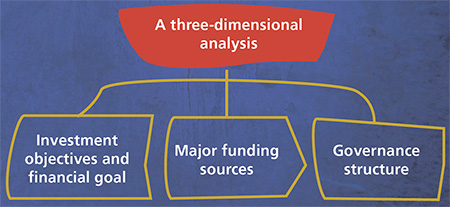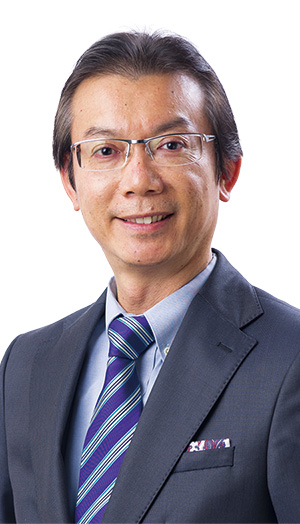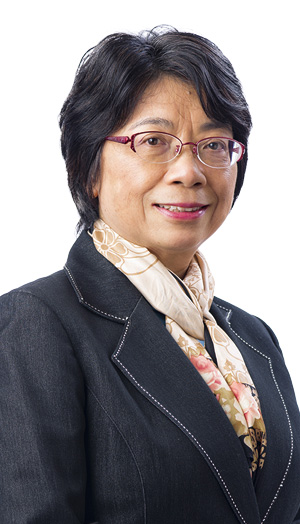Dr Sidney Leung, Associate Head and Associate Professor
in the Department of Accountancy, and Professor
Phyllis Mo of the Department of Accountancy show
how Hong Kong's burgeoning social enterprises sector
is shaping up to the challenge of maintaining financial
independence. This article is based on "Enhancing the
competitiveness and sustainability of social enterprises
in Hong Kong : A three-dimensional analysis," by Sidney
Leung, Phyllis Mo, Howard Ling, Yanto Chandra, So
Sum Ho, published in the China Journal of Accounting
Research, 2019.
Hong Kong social enterprises
have reached an all-time high and
increasing numbers can sustain
themselves financially, breaking the
stereotype that they depend on
government bailouts. There are,
however, tensions in the DNA of
these organisations, particularly
with regard to financial discipline.
How important is the bottom line?
Is self-sufficiency sufficient? Or is
it acceptable if business revenues
cover only part of the costs?
Modern-day ideas of managerial
accountability tend to encourage
a regime of profit, so that SEs
can reinvest in social activities or
support further social causes. So
how are Hong Kong's SEs doing?
Profitability of Hong Kong social enterprises
- 27% of SEs made no profit over the past five years
- 41% generated profits in one to three of those years
|
Growth of Hong Kong social
enterprises
|
In a society of rampant inequality,
The Hong Kong SAR Government
and social service sector have
been actively promoting the
development of social enterprises
with entrepreneurial thinking
and innovative approaches. The
idea is to enable the socially
disadvantaged to be self-reliant
through employment, and to meet
the needs of various community
groups. But SEs are not merely
benevolent entities. They are also welfare operations that work
according to market mechanisms
in an effort to generate substantial
social value and jobs for the socially
disadvantaged in the community.
|
Inequality: Hong Kong's Gini
coefficient now stands at 0.539,
its highest level in 45 years, the
eighth most unequal country
in the world. By comparison,
Singapore is at 0.459 and the
US is at is 0.450. This inequality
is most starkly apparent in the
housing market. Hong Kong
is ranked as the world's least
affordable housing market. It
takes an average family 20.8
years of savings to afford a
home.
In the Gini coefficient, zero
represents maximum equality
and one represents maximum
inequality.
Source: http://worldpopulationreview.com/
countries/gini-coefficient-by-country/
|
A harsh reality - many SEs
suffer losses
Many SEs with important social
missions have failed after a few
years or are struggling to survive.
The findings of the Fullness Social
Enterprises Society Report (2015)
provided a glimpse into their
sustainability. This report showed that only 19% of SEs were able
to achieve break-even or profit by
the end of their second year of
operation, rising to 53% by the end
of the fifth year. This improvement
is encouraging, but also points to
a harsh reality that many SEs suffer
endemic financial losses in their
operations. The 2015 report also
showed that 23% of SEs ceased
operations within five years and the
non-survival rate increased to 55%
within ten years.
As they wean themselves away
from government funding, SEs are
now facing up to the challenge of
achieving economic sustainability.
There is an increasing demand from
SE practitioners, the government
and other stakeholders for a better
understanding of what causes the
success or failure of Hong Kong
SEs. Our study, "Enhancing the
competitiveness and sustainability
of social enterprises in Hong
Kong: A three-dimensional
analysis," focuses on the impacts
of three key dimensions of social
entrepreneurship on the SE's
profitability, business planning
and management: (1) investment
objectives and financial goal; (2)
major funding sources; and (3)
governance structure.
Can social enterprises survive
without support?
Through two rounds of invitation
sent to randomly selected SEs, a
total of 22 SEs agreed to participate
in our study. In-depth interviews
based on the questionnaire were
conducted with the owner/founder
or key manager of each selected
SE during the period from
December 2017 to April 2018.
The participating SEs operated
mainly in retail businesses (45%),
catering businesses (23%), and
workshops (14%).
Regarding investment objectives,
55% of SEs aimed at dual
investment objectives, that is
a mixture of social impact and
financial return, whereas the
remaining 45% said that social
impact was their sole investment
objective. In terms of financial goals,
less than one-third (32%) rated
"profitability" as their financial
target. Nearly half of the SEs (45%)
aimed at "self-sufficiency." Another
23% accepted losses and their
financial goal was "contribution,"
that is business revenues should
cover part of the costs.
In terms of profitability, 27% of
SEs had never made a profit in any
single year over the past five years,
41% of SEs had generated profit in
one to three of those years, whilst
about one-third (32%) recorded
profit in at least four of the past
five years.
In terms of main funding source, 41% of SEs relied on private
funding, 32% on funding
support from non-governmental
organisations and 27% on
government funding. Regarding
governance structure, the majority
(64%) were run by non-owner
managers. In the remaining 36%,
the owner also served as the key
manager. Just under half, (45%) of
SEs had established an overseeing/
advisory committee.
The investment objective makes
a difference
Unsurprisingly, we found that SEs
with a dual investment objective of
social mission and financial return
were more sustainable than those
only aiming for social impact. SEs
with dual investment objectives had
an average of 2.75 profitable years
in the last five years, outperforming
SEs with the sole objective of social
impact (2.1 profitable years).
High-profitability SEs, those with
at least four profitable years in
the last five years, were more
likely to aim at either "self-sufficiency"
or "profitability" as
their financial goal and to adopt
more rigorous business and
financial management than low-profitability
SEs. Specifically, 86%
of high-profitability SEs aimed
at either "self-sufficiency" or
"profitability" as their financial
goal. In contrast, 50% of low-profitability
SEs considered
"contribution" (business revenues
cover part of costs) as their
financial goal. Over 70% of high-profitability
SEs had a business
plan and were more likely to use
budgeting to measure business
performance than low-profitability
SEs. Also, high-profitability SEs
produced cash flow forecasts
more frequently compared to low-profitability
SEs.
The funding source makes a
difference
We partitioned the sample into
three groups based on their
major funding sources, namely
NGO-funding, government-funding,
and private-funding,
and compared various attributes
of their business and financial
management. We found that 86%
of NGO-funding SEs had dual
investment objectives, reflecting
that NGOs typically expect their
SE subsidiaries or units to earn
profit and be self-sustainable.
Indeed, NGO-funded SEs were
the most profitable with an
average of 3.29 profitable years
in the last five years. Only 33% of
government-funding SEs had dual
investment objectives. Although
many government-funded SEs
had a single objective of social
impact, their profitability index
(2.67 years) ranked second out
of the three groups. It is alarming
that privately funded SEs had the
poorest record of profitability
(1.67 years only) even though
they had ranked "profitability" as
their first preference in terms of
financial goal. Such SEs had the
lowest scores in financial planning
and management.
The presence of an ownermanager
makes a difference
As with any for-profit enterprise
or family firm, the presence of an
owner-manager impacts on how
an SE is managed. SE governance
structures vary according to
funding source. Specifically, 67%
of privately-funded SEs were run by
owner-managers, compared with
just 33% for government-funded.
As expected, all NGO-funded SEs
were managed by professional
managers. The establishment of an
overseeing or advisory committee
was not common in privately-funded
SEs (33%). Half and slightly more
than half of government-funding
and NGO-funding SEs respectively
had an overseeing/advisory
committee.
We analysed the differences
in profitability and business
management practices between
owner-manager SEs and nonowner-
managed SEs. The
results showed that non-ownermanaged
SEs performed better
in profitability (2.71 years) than
owner-manager SEs (two years).
Compared to owner-manager SEs,
non-owner-managers SEs had
more detailed budget including
capital expenditure and operating
expenditure of start-up costs
and were more likely to profile
competitors in the business plan.
Non-owner-manager SEs were
also more sophisticated in financial
planning and management. These
findings are consistent with the
notion that SEs managed by a non-owner key manager are more
competitive and sustainable than
owner-manager SEs.
We also addressed the question
"Does having an overseeing/
advising committee matter in Hong
Kong SEs?" The results showed that
SEs with an overseeing committee
prepared more detailed budgets
and had a greater tendency to
adopt updated business plans
than those without one. SEs with
an overseeing committee also
developed their business start-up
plans more comprehensively and
thoughtfully such as by setting up
a supply chain for their product/
service in business start-up plans.
Policy implications and
recommendations
Collectively, the research findings
showed that Hong Kong SEs are
in general not yet embracing
the importance of financial
sustainability, nor the notion of
"social enterprise" as a for-profit business.
To enhance the competitiveness
and sustainability of the SE sector in
Hong Kong, we have the following
recommendations.
- SEs should embrace realistic
and sustainable dual investment
objectives and should manage
and run their enterprises from a
sustainability point of view.
- SEs should prepare quarterly, if
not monthly, cashflow and profit
and loss forecasts, evaluate the
operating performance with the
forecasts and revise business
plan and forecasts accordingly.
- SEs should establish an
overseeing/advising committee
with at least 3 members, at least
one from sales and marketing,
one from accounting/finance
and one from the expertise in
the related industry.
Dr Sidney Leung
Associate Head and Associate Professor
Department of Accountancy
Professor Phyllis Mo
Professor
Department of Accountancy



